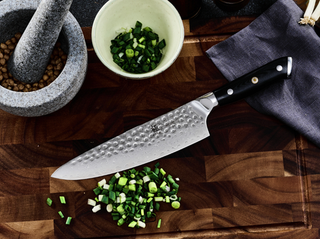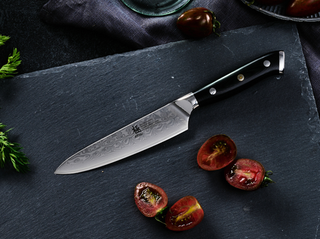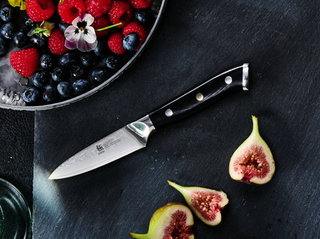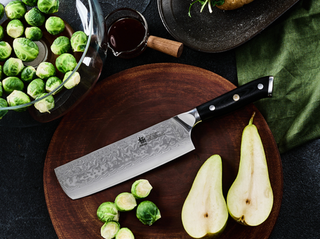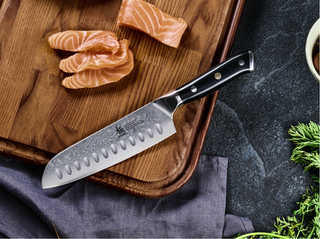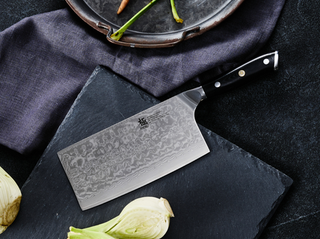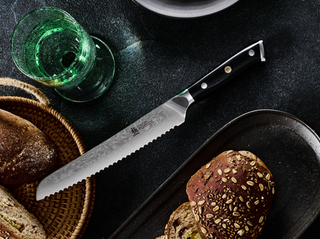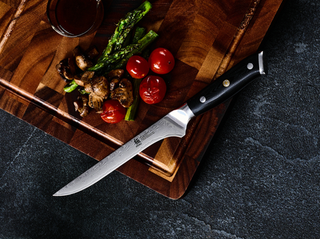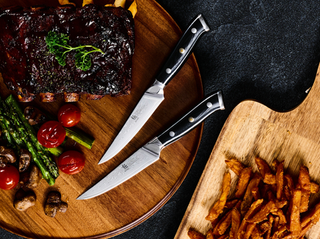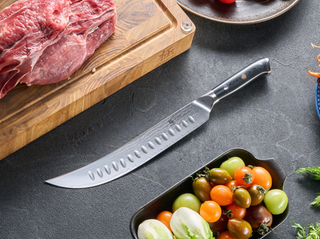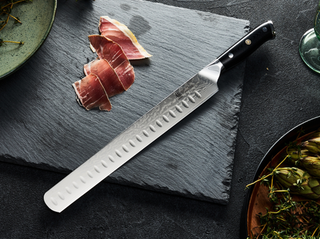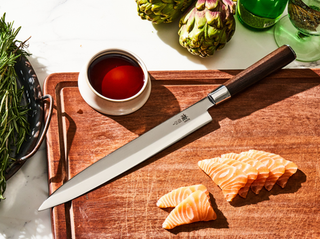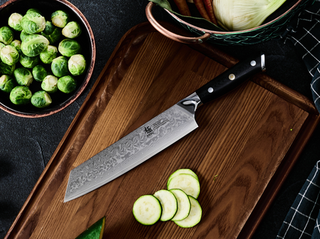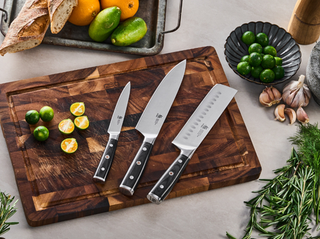Most home cooks don't know that traditional steak knives can harbor harmful bacteria between uses, even after washing. That's why professional kitchens and serious home cooks are turning to ionic silver-coated knives, backed by scientific research, as their go-to choice for both performance and peace of mind in the kitchen.

1. Why Do Steak Knives Turn Black? (And How to Prevent It)
Ever pulled out your favorite steak knife only to find it looking darker than usual? That darkening or blackening isn't just an eyesore; it's actually your knife telling you something important about its care and maintenance.
High-carbon stainless steel knives can develop this darker color when they react with food acids, moisture, or even the air itself. Think about what happens to an apple when you cut it and leave it out – it turns brown. Your knife goes through a similar process, just slower.
Preventing this is pretty straightforward. After all, you wouldn't leave your car out in the rain without protection, right? Same goes for your knives.
Quick fixes that actually work:
- Clean your knives right after use – yes, even when you're in food coma after that perfect steak
- Dry them immediately with a clean cloth (not air drying!)
- Apply a thin layer of food-grade mineral oil before storing
That food-grade mineral oil creates a barrier between your knife and moisture in the air, kind of like how chapstick protects your lips from drying out.
2. Why Are Some Stainless Steel Steak Knives Coated with Ionic Silver?
Your kitchen counter has more bacteria than your phone screen – and your knives touch pretty much everything in your prep area. Remember when your grandma used real silver utensils for special occasions? There was actually some science behind that tradition. Silver has natural antimicrobial properties – something modern knife makers such as Kyoku have cleverly adapted using ionic silver coating.

While stainless steel steak knives provide the strength and durability you need for cutting that perfect medium-rare steak, the ionic silver coating adds an extra layer of food safety protection. A 2022 study published in Scientific Reports demonstrated that ionic silver coating actively works to keep your knives cleaner between uses.
But what does this mean for your everyday cooking?
Imagine having a knife that not only cuts beautifully but also fights against harmful bacteria. The ionic silver coating works 24/7, even when your knife is just sitting in your knife block. It's like having a tiny cleaning crew working overtime on your cutlery.
The real-world benefits hit close to home:
- Less worry about cross-contamination when prepping different foods
- Extra protection during those times when cleaning isn't immediate (we've all been there)
- Longer-lasting cleanliness between uses
And unlike those old silver utensils that needed constant polishing, this modern ionic silver coating is low-maintenance and doesn't affect the taste of your food.
Most people don't realize that knife safety goes beyond just sharp blades. Lab testing shows ionic silver continues fighting bacteria long after you've finished cooking. So even if you're rushing to get dinner on the table and can't clean up immediately (we get it, life happens), you've got an extra layer of protection.
3. Best Ways to Store Steak Knives to Prevent Bacterial Growth
Many home cooks make the mistake of cramming their knives into drawers or leaving them wet in the dish rack. Both are recipes for bacterial growth.
Here's what actually works:
- Store knives in a dedicated block or magnetic strip
- Make sure they're completely dry before storage
- Keep them in a ventilated area (not in a closed, humid drawer)
- Consider using knife guards if you must store them in drawers
While convenient, knife blocks can harbor moisture if not properly maintained. Empty and clean yours every few months. Yes, it's another task for your to-do list, but it matters for food safety.
4. How Often Should You Replace Your Steak Knives? (Safety Guide)
Quality steak knives should last years, not months. But there are clear signs it's time for a replacement:
When to Replace Immediately:
- Loose handles or wobbling blades
- Visible rust spots that won't clean off
- Deep chips or cracks in the blade
- Permanent stains or discoloration that might indicate material breakdown
Signs your steak knives are due for an upgrade:
- Struggling to cut through meats cleanly
- Needing excessive force to slice
- Regular sharpening no longer improves performance
- Handles showing significant wear
The lifespan of your steak knives depends largely on:
- Initial quality of materials and construction
- Frequency of use
- Proper maintenance and storage
- Regular cleaning and care practices
High-quality steak knives with features like ionic silver coating and proper maintenance can extend this timeline significantly.
Don't wait until your steak knives are obviously damaged. Regular checks help ensure both safety and performance.
5. What Makes Restaurant-Grade Steak Knives Different from Home Versions?

Restaurant kitchens prioritize two things: safety and efficiency. Their knife choices reflect this. Professional-grade steak knives often include features that home cooks overlook but shouldn't:
Food Safety Features:
- Antimicrobial properties (like ionic silver coating)
- Seamless construction to prevent bacterial buildup
- Non-porous materials that resist contamination
Performance Aspects:
- Better edge retention
- Ergonomic design for repeated use
- Materials that withstand frequent cleaning
While restaurant-grade steak knives cost more upfront, they're built to handle daily use while maintaining food safety standards. For serious home cooks, investing in professional-quality steak knives is about bringing commercial kitchen safety standards to your home.
6. Are Steak Knives Safe for Dishwashers? (What Experts Say)
The short answer? Skip the dishwasher. Even if the label says "dishwasher safe", running your steak knives through hot wash cycles does more harm than good.
Professional chefs and food safety experts point to several issues:
- High-pressure water jets can damage the blade alignment
- Heat cycles weaken the knife's structural integrity over time
- Harsh detergents can deteriorate protective coatings
- Banging against other utensils dulls the edge faster
I know it's tempting to toss everything in the dishwasher after a big dinner. But taking 30 seconds to hand wash your steak knives will keep them performing better, longer. Just use warm water, mild soap, and dry them right away.
7. FAQs
1) Can ionic silver coating wear off steak knives?
With proper care, ionic silver plated steak knives are highly durable. Hand washing and proper storage will help maintain its effectiveness. Avoid abrasive cleaners or scrubbing pads that could damage the coating.
2) Do silver-coated knives affect food taste?
No, modern ionic silver coatings are engineered to be taste-neutral. Unlike traditional silver utensils, they won't leave any metallic taste on your food.
3) Are silver-coated steak knives worth the extra cost?
When you factor in the added food safety benefits and longer lifespan of quality silver-coated knives, they often provide better value over time compared to standard stainless steel knives that may need more frequent replacement.
